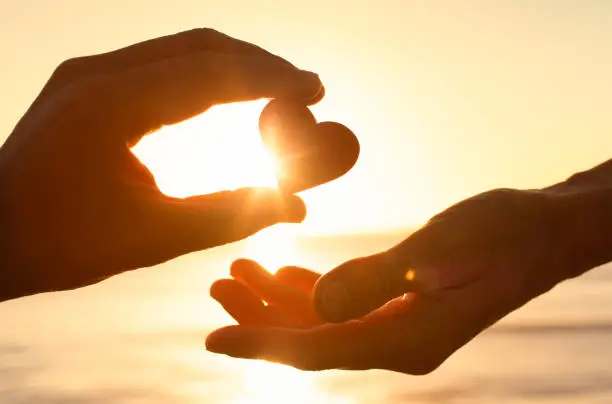
Helping Teens with Depression
Currently, due to Covid, the incidences of depression among teens are exceptionally high. This is because the teen years are the identity years – of

Falling in love is most often considered a mysterious thing. But ask people who come from cultures where arranged marriages are the norm and you will find love is not so mysterious at all. The success rate of “arranged” marriages far outweighs those where the partners chose one another. Hmmmm.
WilliamHarley, in his book “His Needs, Her Needs” refers to love as a bank account. The account was opened the day you met the “love of your life.” It may have been a chance meeting or a set-up by friends or family, with the sparks or without them, but the outcome – that is whether you chose to build a life together – had more to do with deposits and withdrawals than chemistry. Let me explain.
The process of “falling in love began with a connection. When Pink met Blue, she opened an emotional account in Blue’s name. Because of that first “great” connection a “great” deposit was made in his bank account. When Blue met Pink, and felt that same connection, he also opened an emotional account in Pink’s name. Good connection? Good deposit. Immediately there was a willingness to invest more.
But had that first connection not turned out so great – Blue is a jerk, self-absorbed, boring, etc. – then Blue’s account would have begun with a withdrawal. Even though after that first meeting, Blue wanted to pursue Pink, (good account), its unlikely that Pink would have responded to Blue’s invitation. (bad account).
Now let’s assume that Pink and Blue enjoyed each other’s company. Good times, good conversations, good memories, shared interests etc. As time went by the deposits would have been considerable and the strength of that account would have resulted in strong feelings. The more time they spent listening, observing, and attempting to please the other, the greater the likelihood that their feelings were growing, as their accounts were growing.
Somewhere in the dating period they may have disappointed each other, been late, been insensitive, been unavailable, argued or hurt one another in some way. Because the accounts were strong, small occasional withdrawals still left the account in the green and the relationship continued – the “love” was in tact.
Then marriage, or moving in happens. Now the real stuff of life happens: the irritations, the bad hair day, bad breath, annoying habits – each event taking a small withdrawal from the other’s account. In the beginning, in the “honey-moon stage,” they apologize quickly, are quick to make amends, have time for more dates, special times, great sex, and memories. They quickly regain what was lost. The refill and refuel each other’s emotional accounts.
AS LONG AS THE DEPOSITS OUTWEIGH THE WITHDRAWALS, LOVE THRIVES.
But then what happens? Living under one roof, putting a ring on each other’s finger, and looking and feeling like a committed couple, Pink and Blue stop being tender, patient, studying and getting to know one another. No more dates, no more special memories. Babies come along and with them many, many withdrawals: Pink feels unsupported, Blue feels left out. Both are tired, cranky, impatient, stressed financially. Soon those very great, full, highly invested accounts begin taking a hit – small hits, and occasionally one big one – the big fight, the drunken episode, the flirtation with another Pink or Blue…. Give it 5 years? 10 years? and one day Pink wakes up and looks at Blue and wonders, “what did I ever see in this man?” The real question is – Has he really changed or has his account run dry?
And there is more to this story….. Without realizing it the Accounting changes. At the beginning the account was fully open to access and the focus was on depositing into the other’s account. There was no thought about, “Do I have enough to give?” There were no bank books where scores were kept and everyone gave expecting something in return. Giving was an attempt to engage, to finance love. Blue gave, Pink gave.
Then because of the arrival of babies, personal disappointments, life’s pressures or family dynamics, loss, work, and any number of things Pink’s or Blue’s personal accounts grow low. Unfortunately, for the sake of self-preservation, the first thing they do is to stop investing and depositing in the other person. The second thing they do is to start keeping score. Blue stops giving. Pink stops giving. Both start demanding more.
Think about it. If you had a bank account with $5000 in it, and a close friend came by and said, “Hey can you spot me a $20?” its likely we would say, “Sure.” That 20 won’t have much of an impact, and as we feel full, we enjoy being able to give and help a friend. But lets say hard times come and now the account is down to $100 and payday is a couple of weeks away. The same friend, with the same request may get a different response. The simple math of it is we are holding on tightly and anxiously to those last 5 twenties. We look at the bank statement more often. We become more money conscious. And so it is in relationships.
When the relationship starts suffering and our own account starts getting near the line, we start feeling differently about our spouse’s account. We withhold, and by doing so we (not them) change the nature of our relationship. Without our continued deposits (niceties, tendernesses, loving sacrifices, happy events, shared memories etc.) going into their account they move into self-preservation.
All of us, without realizing it, may begin well but at some point turn selfish in the relationship. We are quick to notice it in others, but not so quick to see how we changed first. The same things that meant “no big deal” to us in the early years, that made small withdrawals but didn’t seem to matter in light of all that was in the account – now so major. We soon believe those little things ARE the problem. We become convinced that unless Blue or Pink stops those behaviours, attitudes or actions, we cannot or will not live with them anymore. Suddenly we hear ourselves say, “I just don’t love you anymore.”
What is noteworthy, is that love is the most fickle emotion on the planet. It is as temperamental as life itself. How easily it can leave but how easily it can return. Its a simple matter of deposits. There are four things that can change the feelings of Pink or Blue – simple, simple – but if practiced can turn the relationship around and restore the love feeling.
1. Jump right over the fact you feel like you are drained and dry and have nothing to give and RISK giving, investing and doing all those little things you did at the beginning: tendernesses, kindnesses, dressing up, smelling good, making a date, simple surprises, love notes, considerations, etc, that you did at first – even if you feel you are moving into the red and are heading for bankruptcy. Start investing in the other’s life and by doing so you will restore your own account he/she opened in your name.
2. Stop keeping score – I’ll give if you give. IF you are really so dry that you feel you have NOTHING left to give, then find resources from outside your marriage, friends, family and faith to help restore your own love account so you can give what you have received from others. Don’t depend on your partner to be your sole source of supply.
3. Stop assuming that the withdrawals that are being made from your partner’s account are being done deliberately because they are selfish and unfeeling and don’t love you anymore. Understand that they have been preserving themself and must feel drained or dry. Open communication around, “what can I do that will help you feel and know I love you.” What can WE do together to restore the good times, and make some new deposits into our floundering accounts. And side note -putting kid’s needs at the centre may often be the reason the relationship is failing. There are seasons where they demand a parent’s attention – but nothing can drain a marriage faster than when a child is considered more important then the parent who conceived it.
Simply put – the accounts will rise, the love will return if you just do what you did at the beginning. Return to your first love and do the things that love required.

Currently, due to Covid, the incidences of depression among teens are exceptionally high. This is because the teen years are the identity years – of

As human beings we all want to belong somewhere. Typically we find those needs met in our families. Our need to belong, being as huge

Enter your email and password and get editing.